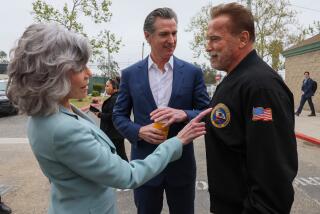For Starters, Let’s Cut Oil Consumption
- Share via
To many people, the Gulf War seems far off and remote and, despite instant television coverage, not really involving. Others, watching the same things over and over on television, feel tremendously involved, but powerless.
Apparently it’s too early for any home-front war effort. Beyond the initial blood drives and the anti-war demonstrations, there’s nothing being done--active, defensive, symbolic--at a citizen level, even a consumer level.
Why is there no movement--enlisting, one would think, both war supporters and war critics--to finally cut the oil consumption that got us into this? It might unify the country, give people an emotional outlet and cut down on further conflict. It couldn’t hurt.
Perhaps the war just doesn’t strike everyone as sufficiently threatening, despite the many possible scenarios for how it could explode into World War III. The names “Operation Desert Shield” and “Operation Desert Storm,” meant to be attractive, were too attractive, making it all sound like field day at a military school. What’s more, the enemy’s strength is still unknown: One can wage war with a couple of Scud missiles and constant television replay makes them seem like dozens.
Citizens here have been involved in absolutely no defensive planning. Government officials have been strangely silent on the issue, despite general anticipation of possible attack here--not by Iraq’s military but by its terrorist network. Airports are beefing up security, the FBI issues warnings, municipal reservoirs are being closed to visitors to protect the water supply.
But there is no civil defense training, if indeed there are civil defense procedures. The only defensive activity is that of nervous consumers snapping up surplus gas masks, because they saw Israelis wearing them on TV and ignore the fact that behind the prop there must be a plan.
There’s an equal lack of supportive activities enlisting ordinary citizens. Maybe a high-tech war doesn’t require citizens to salvage scrap metal, or housewives to roll bandages, or children to collect milkweed pods and silver paper from gum. Who can even remember why we collected gum wrappers (to strip off the bit of metal) and milkweed pods (for the floss inside that could serve as a kapok substitute in life preservers).
Apparently no one anticipates shortages of food or materiel, no one discusses contingency plans for rationing. For one thing, it’s early: “On Dec. 14, 1941, were we doing any of that stuff?” asks Martha Bial, a New York social worker. For another, we’re said to be awash in everything from freeze-dried convenience meals to gasoline.
There could yet be rationing, of course, given not so much actual shortages but “the expectation of shortages when the government enters the market as a consumer,” says Harvard history professor Charles Maier. But it’s too soon to tell “where will the crimp come if this war goes on and if casualties go into the thousands. It’s not clear what products would be affected--conceivably petroleum, some medical supplies perhaps.”
The war’s high cost ($600 million to $1 billion a day) is unfortunately considered too politically sensitive to be made a rallying point. An Administration that just took heat for its tax increase is likely to think that leaving the bill for this war to the next generation is, as usual, a good idea. War bonds, at one time very appealing as patriotic instruments, would probably be damned now as more “deficit financing.”
There is one possible focus for consumers and government alike, for both those people who support the war and those who don’t. We could start cutting oil consumption and our knotty dependence on and involvement with oil-producing nations.
This is not a popular idea, and it certainly hasn’t had administrative support since Jimmy Carter posed in a sweater and urged us to lessen our dependence on oil. Instead, and for reasons beyond the ken of ordinary consumers, we’re constantly assured and reassured that oil is no problem, at least for today.
Still, one doesn’t have to carry a placard saying “No blood for oil” to realize the advantages of using less oil. It’s an effort everyone could join, and “participation is more than utilitarian,” says Maier. An added benefit is the “social adhesion.”
More to Read
Get the L.A. Times Politics newsletter
Deeply reported insights into legislation, politics and policy from Sacramento, Washington and beyond. In your inbox twice per week.
You may occasionally receive promotional content from the Los Angeles Times.










